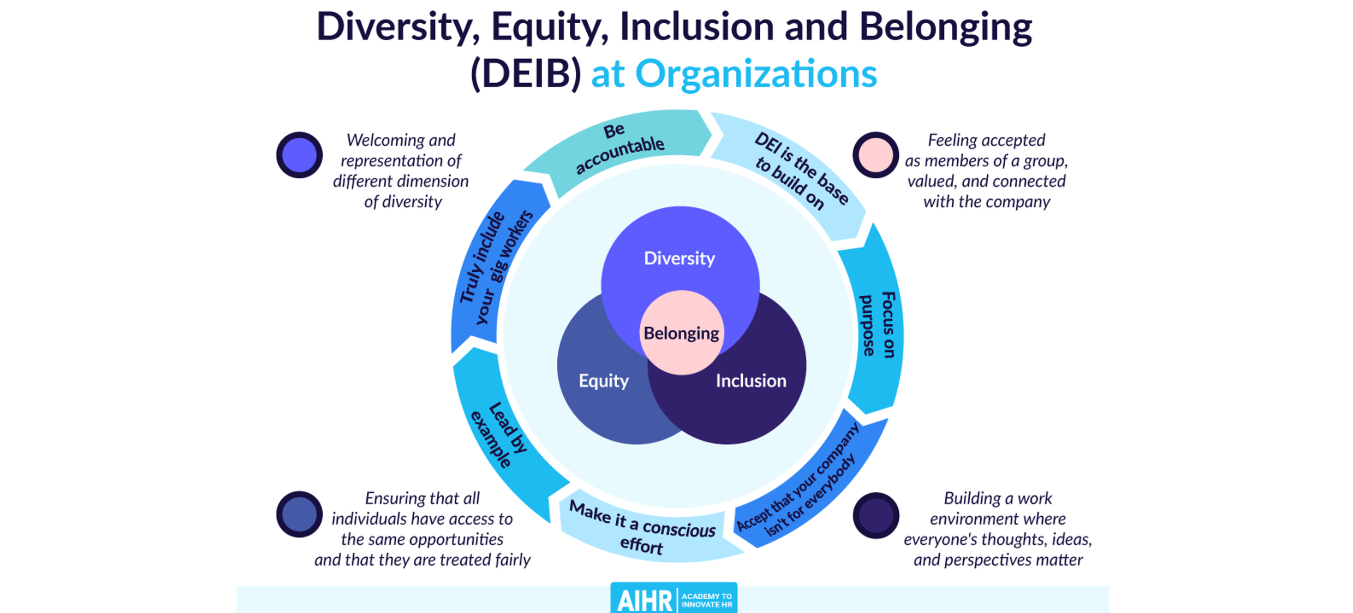Today’s world of work is more competitive than ever. Employee quit rates continue to soar and organizations looking to foster innovation, retain employees, and improve their financial performance. From the perspective of training leaders, LeadX article 2022 shared that Leaders nowadays should focus on helping employees ascend to reach their full potential through three areas: mental and psychological safety; belonging; and esteem.
According to the Deloitte DEI and Trust Survey, 40% of employees would prefer to leave an organization that does not follow DEIB practices.
What does DEIB mean?
DEIB stands for diversity, equity, inclusion, and belonging; Through DEIB, companies can build a healthy and productive workforce with fair and transparent practices.

- Diversity (D): It represents the distinct backgrounds, ideas, and perspectives of employees. A workplace can have diversity in gender, ethnicity, race, culture, country of origin, religion, sexual orientation, age, ideologies, and more. This helps companies use different styles of thought while approaching problems.
- Equity (E): It allows employers to ensure that each professional in their organization receives fair treatment. Note that equity is not the same as equality.
- Inclusion (I): This term refers to the feeling of being included and valued in the workplace. Inclusion helps companies create a welcoming environment and ensure everyone is heard.
- Belonging (B): This last value refers to employees feeling a sense of belonging in the workplace.
What are the benefits of fostering DEIB in the workplace?

1. Experience higher employee engagement
Employees will actively participate in company activities and aid in the development of a positive workplace culture when they do not get discriminated against for their identities and would receive equal rewards and recognition merely based on their performance.
2. Increase in Productivity and Revenue
According to a McKinsey report, companies with higher racial/ethnic diversity are 35% more likely to perform better than their competitors. By embracing DEIB, companies can gain a competitive edge and improve their bottom line.
3. Reduce Employee Turnover
According to Gallup, it’s a matter of creating a genuine appreciation for everyone’s differences and contributions. In fact, Gallup states “If managers could increase the number of employees who believed their opinions counted, organizations could reduce turnover by as much as 27%, safety incidents by 40%, and increase productivity by 12%.”
How to promote DEIB in the workplace?

1.Create a DEIB plan
Start by asking employees for feedback about their experiences through anonymous surveys. This can help identify a successful diversity and inclusion strategy.
Don’t forget to create concrete objectives that are transparent to all employees. Involve your teams in developing the plan, and ensure everyone knows the goals you’re working towards and how they can help reach them.
2. Start, support, and encourage participation in Employee Resource Groups (ERG)
90% of Fortune 500 companies have one or more ERGs. These groups benefitted them and their career. However, having these groups is not enough. Organizations need to start, support, and encourage participation. First, without strong leadership support, it can be difficult for these groups to achieve their goals and impact the organization.
3. Utilize development opportunities
Provide opportunities for employees to develop their skills and expand their knowledge. Investing in your team will help them grow professionally, build team morale, and make them feel valued at work. Consider offering courses or workshops focusing on DEIB and soft skills besides technical training.
For example, provide your employees with diversity training to educate them about the different types of diversity, recognizing and appreciating it, and working together more effectively. Diversity training helps employees understand the importance of inclusion and belonging in the workplace.
4. Invest in leadership training

It is important to equip leaders with intercultural management skills, stress management, conflict management, etc. Those training designed to teach leaders how to be more effective, engaging, and inspiring will help develop a welcoming and supportive culture for all employees.
Overall, promoting DEIB in the workplace is not an easy quick fix; rather, it's the right thing to do. It takes time, effort, and a lot of planning. However, it's worth it. Organizations that promote these values see improved productivity, creativity, and innovation. They also experience less employee turnover and litigation. Schedule a meeting with TYDE to know more about our diversity-focused training!
